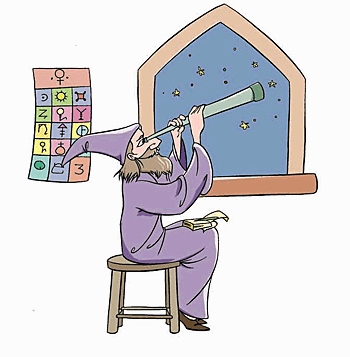
From their movements, wise men divined the purposes of such deities, taking into account the phases of the moon, eclipses, the proximity of planets to the brighter fixed stars, and other phenomena, including the positions of constellations other than those forming the signs of the zodiac.
Some examples include the new moon rising in a cloudy sky presaged victory in a coming battle, while, if it failed to rise as an anticipated time, it became an omen of defeat.
When astrology advanced as a science, the casting of horoscopes and other exact calculations replaced the old traditions and astromancy became less significant.
Its systems are largely obsolete, but its lore has survived as modern superstitions, such as expecting bad luck if you look at the moon over your left shoulder, or making a quick wish when you see a shooting star.
It’s interesting to note that astromancy became "astrology", and "astrology" became the science we now call "astronomy".
